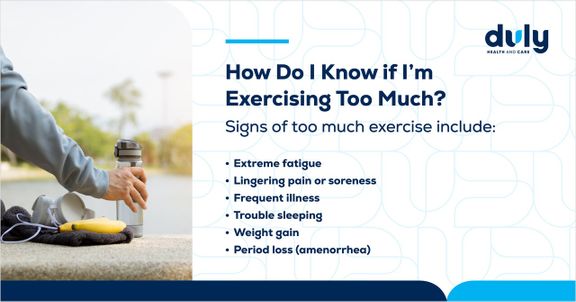You’ve heard about the importance of exercise in staying healthy. It’s one of the best things you can do for your health, and it helps you maintain a healthy weight, reduce your risk of chronic disease, strengthen your muscles and bones, improve the health of your brain, and enhance your ability to go about your day-to-day activities.
With all the benefits of exercise, you may wonder, “Is more always better?”
As it turns out, there can be too much of a good thing when it comes to exercise. Engaging in more exercise than your body can handle can lead to a range of problems both physically and mentally.

Here are 4 ways too much exercise can damage your health – and how to find the right amount of exercise for you.
1. Too Much Exercise Can Cause Injuries
Exercise works your muscles, but too much of it can overwork them, creating new or worsening existing injuries.
Often referred to as overuse injuries, exercising too much can create repetitive trauma that causes muscle and joint injuries, such as tendinitis (inflammation of tendons between your bones and muscles) and stress fractures (tiny cracks that occur in bones).
Being overtired from excessive exercise can also make it hard to concentrate. Depending on how you’re exercising, this can be dangerous. For instance, during strength training, you could overload certain muscles or even drop a weight if you’re not paying attention.
Do you think you have an overuse injury? Make an appointment with a Duly Sports Medicine expert today to prevent and treat exercise-related injuries.
2. Too Much Exercise Can Lead to Poor Nutrition
Exercise is a great way to burn extra calories and boost your metabolism, helping you to maintain a healthy weight. However, if you overexercise, you may not give your body the fuel it needs.
Whether you’re running, biking, playing tennis, or dancing, your body uses a combination of protein, fat, and carbohydrates to fuel activity. If you exercise too much, you might not have enough fuel to keep going in a healthy way.
Not eating enough for your level of exercise can lead to fatigue, trouble sleeping, soreness, slow muscle recovery, and hormonal problems.
Even if you eat enough but don’t eat a healthy diet to support your level of exercise, you can damage your health in the long term. Eating processed foods and empty calories alongside exercise can increase your risk of dying earlier compared to someone who eats healthy and exercises.
3. Too Much Exercise Can Cause Heart Problems
Physical activity strengthens your heart, but you can work it too hard by overexercising. Extreme exercise over time can lead to heart damage and problems with your heart’s rhythm. This is especially true if you have a genetic factor that puts you at an increased risk.
After a single extreme exercise event, like running a marathon, blood samples of runners have shown signs of heart damage. While this usually goes away with rest and recovery, repeated extreme exercise can lead to changes in your heart’s structure, such as scarring or thicker walls.
What’s more, in people who have certain types of heart disease, high-intensity exercise can raise the risk of heart rhythm disorders, such as atrial fibrillation. If you’ve previously had a heart attack, talk to your healthcare provider before starting exercise again, and make sure to begin physical activity safely.
4. Too Much Exercise Can Be a Sign of Addiction
A psychological or physical dependence on something – even if it’s a good thing – is a sign of addiction. Exercising can be addictive because of the pleasure it brings by releasing hormones called endorphins and dopamine. Eventually, when the impact of the hormones subsides, you’re left craving more.
While being addicted to exercise is less common in the general population, it’s more likely to occur in people who have eating disorders or anxiety disorders.
Signs of being addicted to exercise include:
- Exercising too much
- Exercising too intensely
- Exercising through injuries, illness, extreme weather, or fatigue
- Planning your entire day around exercise
- Feeling irritable when you can’t exercise
How to Avoid Overtraining
Recovery is important no matter how much you exercise. To get the right amount of exercise and rest, start by listening to your body. If you’re tired, hurt, anxious, or otherwise unwell, take a rest day or two – and get back to some light exercise when you feel up to it.
Other ways to avoid the dangers of exercising too much include:
- Resting for a minimum of 6 hours between exercise sessions
- Taking at least one rest day per week
- Decreasing the length and intensity of exercise leading up to competitions
- Eating enough to support your level of exercise
- Staying hydrated throughout workouts
- Getting at least 8 hours of sleep per night
If you feel you can’t control how much you exercise, talk to your primary care provider. They can help you make a plan moving forward, which may involve talking to a mental health provider.
Exercise is undoubtedly a good thing and an important way to stay healthy. But too much exercise can overwork your body and mind. By giving yourself enough rest, you can get back to your exercise routine in a safe and productive way.
Health Topics:







